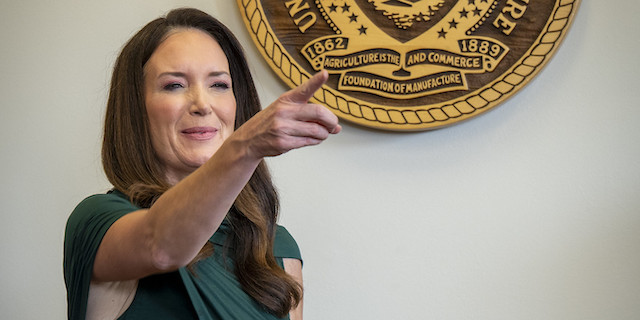Ranchers back blueberry growers in trade claim
Published 8:30 am Tuesday, January 26, 2021

- R-CALF USA is producing a podcast and magazine for its members.
Some cattlemen are cheering on blueberry farmers who are seeking protection from foreign competitors, countering the jeers from sectors of U.S. agriculture that depend on serene trade relations.
Almost two dozen organizations, led by R-CALF USA, have sent a letter urging the U.S. International Trade Commission to recognize that imported blueberries are seriously harming U.S. growers.
R-CALF CEO Bill Bullard said Monday the letter was inspired by one sent in December by 31 farm associations and companies warning the commission to not start a trade war over blueberries.
“We felt a need to counter that,” Bullard said. “We respect and admire the blueberry farmers for taking this action, which is an action we may be taking in the future.”
Blueberry farmers in Washington, Oregon, California and elsewhere claim foreign blueberries flood the U.S. market in the spring and fall, suppressing what should be profitable early and late harvest prices.
U.S. companies that process or grow foreign blueberries blame low prices on U.S. farmers competing with each other.
The Trump administration ordered the trade commission to investigate whether imports are or will seriously injure U.S. blueberry farmers.
The commission is due to make a determination by Feb. 11 and submit a report to the Biden White House on possible trade actions, such as tariffs or quotas, by March 29.
Associations representing commodities that depend on oversea customers — such as apples, wheat and soybeans — argue that tariffs on foreign blueberries could lead to retaliation that hurts other sectors of U.S. agriculture.
R-CALF’s opposing view was signed by groups such as the Cattle Producers of Washington and the Stevens County Cattlemen’s Association, whose members raise beef for U.S. consumers.
The letter was also signed by groups representing rural residents, small farms and U.S. manufacturers, including the Coalition for a Prosperous America.
Prosperous America CEO Michael Stumo said the U.S. shouldn’t base its trade policy on fears about what smaller countries will do. “Otherwise we’re just wimps,” he said.
Stumo said he expects the Biden administration to be open to protecting blueberry farmers. “I don’t think the administration change will make a difference in this case,” he said.
U.S. blueberry farmers produce fruit for the growing domestic market. Growers allege they haven’t benefited from higher demand because other countries are making a determined run for market share.
Bullard said cattlemen have similar concerns and are watching how the Biden administration handles the blueberry case. Bullard called the level of agricultural imports a “core issue to America.”
“The cattlemen are experiencing the same injury from import surges as blueberry farmers,” he said. “At some point we have to address this, or we will be in as serious shape as the blueberry growers.”
The U.S. Trade Act of 1974 allows the White House to impose trade barriers to protect an imperiled industry.
The governments of Canada, Mexico, Peru and Chile have pushed back, saying their farmers are not harming U.S. growers.
The trade commission held a hearing Jan. 12. Following up, the Blueberry Coalition for Progress and Health, made up of multinational companies, argued U.S. growers failed to show they were suffering.
“This is hardly an industry on the brink of economic extinction. It is thriving and not deserving of safeguard relief,” the coalition claimed in post-hearing comments.
U.S. blueberry growers counter that the last five years have been hard, and it’s only going to get worse as other countries ramp up production.
It would not be unprecedented for a White House administration to act on a safeguard investigation started under its predecessor.
The trade commission probe that found China selling washing machines at lower than fair prices was done during the Obama administration. The report was sent to the White House the month Trump took office.






